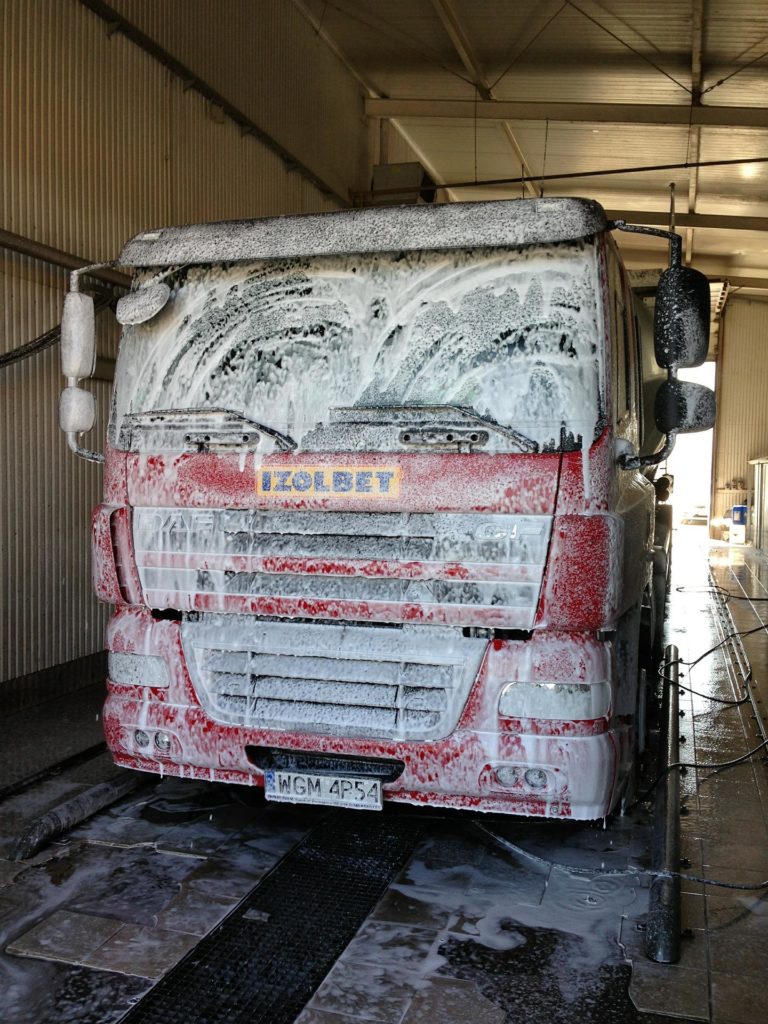
I use a car wash as do others but this truck stop has a smell. What can one do?
Wendy Johnson has a trampoline in her backyard, a little bicycle and a special toy room in the rear of her three-bedroom house in north Baton Rouge to entertain her young grandchildren. But Johnson, a 62-year-old retired pipe welder who worked in the chemical industry, says chronic foul odors around and inside her home north of Prescott Road have altered the way she lives and cares for her grandkids. The horrible smells cause headaches, burning eyes, lethargy and other acute ailments, so the once-avid walker doesn’t go through her neighborhood anymore for strolls. She won’t let the grandkids outside to play or go in the toy room where the smell is strongest inside her home and often wears a mask indoors and sleeps on her couch because of odors. Morning cups of coffee under the carport are also a dicey proposition. Johnson is among a group of residents in the Merrydale area east of Airline Highway who say chemical and sewage smells have been plaguing their neighborhood for the past two years or so, and, despite repeated complaints to authorities and state and local investigations, the smells have been on an uptick again. “On (April 8), when I went outside to let the dog out, the smell, the stench was so strong and so I called my daughter and I started crying and I said, ‘Why do I have to live like this,'” Johnson recalled.
theadvocate.com
They should not have to live like this and the facility should be forced to clean up the mess causing the smell.
Johnson and other residents have pinpointed a Quala Services tanker truck washing complex on Airline Highway as the source of the smells, an operation they contended had not caused problems until the past few years. The smells come and go at different times of the day and night and seasons of the year, residents said, though some said they seemed to get worse when the air was more still in the summer and in the mornings and evenings. Company officials dispute they’re to blame based on their own regular air testing and their operations’ smell containment efforts, but, after repeated visits to Quala’s operations since the fall of 2020, DEQ officials also concluded the smells are coming from somewhere inside the company’s 15-acre site. Investigations in the second half of 2020 led the state Department of Environmental Quality to issue an extensive compliance order against Quala and has prompted revisions to the company’s air and solid waste permits that are still pending, DEQ officials said.
The company, who got to expand, says they have complied and all is well on their end, but the smells continue.
Though the revised permits would authorize an expansion of some of Quala’s operations, company officials say they believe they have addressed all the findings in the compliance order, in part, through permit changes. A Quala spokesman who has worked at the Airline complex since 2001 said Quala takes the health and safety of its employees and the surrounding community as its No. 1 priority and strives to be a “good community steward.” “We always try to operate with that in mind,” the spokesman said. But, as the smell complaints start anew this year, the task of tracking the source of those odors exposes gaps in the way these kinds of nuisance complaints are regulated at the state and local level.
I hesitate to ask what the state does to find and fix these nuisance smells.
After more than 30 complaints about smell in the second half of 2020 — both neighbors and even passing drivers on Airline who pinpointed Quala — DEQ inspectors began a program of trying to isolate potential sources, including the city-parish sewer system, and eventually zeroed in on Quala, regulatory filings show. The Quala Services complex cleans out residual chemicals from tanker trunks, handles and partially treats millions of gallons per year in human waste from portable toilets, and also treats tens of millions of gallons per year in industrial liquid waste, including the chemical-laden waters that seep out of landfills. After treatment, the waste waters go to the city-parish sewer system for final cleansing. Separately, another company on the property processes waste oil and other petroleum products, permit filings show, operations that, like the rest of Quala’s site, produces low-level toxic air emissions, including hydrogen sulfide. The gas, which produces a rotten egg smell, has been among those on which regulators and the company have focused.
I think they found the smell but where is it coming from. Are we back to damage caused by the oil, chemical and gas industry?
As part of their regular operations, company officials say, they do daily air monitoring and “fingerprint” tanker trucks coming in to be cleaned for emissions of hydrogen sulfide. Trucks emitting a part per million of hydrogen sulfide gas or more are sent back, though the human nose can start smelling the gas at concentrations that are 100 times lower, according to federal benchmarks. The complex also has contained the truck-washing and other areas to capture and treat spills and runoff from those operations. DEQ air testing at and around Quala so far has found levels of hydrogen sulfide gas that are well below what the state says starts to pose a chronic or acute health risk, reports say. The air readings, however, were many times above the level necessary to be smelled by the sensitive human nose, according to federal standards, and potentially create the kind of continuing nuisance about which Johnson and other residents are complaining.
In other words, industry is catered to and the pubic suffers.
Among the problems noted in DEQ’s compliance order, regulators said that emissions appeared to be coming down wind of the complex’s large, open-top treatment tanks. Some testing inspectors did in 2020 directly above some of those tanks found elevated levels of hydrogen sulfide and strong foul odors. DEQ officials said the pending compliance order will be a part of their evaluation of Quala’s proposed air permit changes, though company officials contend in filings they can keep emissions and smells down without covering the tanks. Clouding the issue, Quala officials say they did their own perimeter and on-site air testing contemporaneous with DEQ’s air testing and did not detect hydrogen sulfide above the minimum level necessary to smell it, or 10 parts per billion. That has led company officials to believe the smells are coming from somewhere else. The company spokesman said Quala officials have tried to determine that source but have been unable to do so.
Covering the tanks might help with vents that go through scrubbers.
The complex has also had other incidents since the smell problems emerged. In January 2021, a tanker that the company had refused to clean but could not get removed began to leak hazardous gas and forced a shelter-in-place order for residents in a next-door trailer park, filings show. Residents like Johnson, who has lived in the area for 27 years and has her house paid for, contend they still face this stink while regulators try to resolve the problems at Quala. “I don’t know what to do. I wish somebody would … help us. If they would just, if they would just do the right thing, I mean I don’t want them gone. I just want them to do right. I don’t want to keep smelling it,” she said. “I have to live here.”
Zoning is a problem but the standards are not down to where they should be.
DEQ’s ambient air standard for hydrogen sulfide is set at level that is nearly 23 times higher than the level the U.S. Occupational Safety and Health Administration says hydrogen sulfide can start to be smelled, but the state standard remains about 10 times below the level OSHA says can cause nausea and other ailments. While DEQ officials are working on the compliance order and permits for Quala, Greg Langley, spokesman for DEQ, said nuisance problems with odors can be handled at the local government level. However, city-parish officials say there’s not much for them to do after air testing didn’t turn up violations of air standards. “We have invested a lot of time and energy working with LDEQ doing testing and inspections,” said Mark Armstrong, city-parish spokesman.
Industrial zoning should not be close to residential zoning but as the residential area expand the overlap will occur.
Quala’s property is zoned under the city-parish’s light industrial M-1 category. It is Baton Rouge’s second most intensive zoning category and includes truck washes in its allowed uses, city parish officials said. The business is in a strip along Airline that includes fast-food restaurants, tire shops, equipment rental offices and other business but that also has many homes along the immediate fringes of the highway corridor. In addition to toxic air emissions, another byproduct of Quala’s operations is hazardous waste. Deemed a “large quantity generator” of that waste under federal rules, Quala collects a few dozen of tons per year of hazardous waste, reports show, including sulfide compounds and flammable liquids. The waste can only be stored temporarily on site and must shipped off within 90 days. But Ryan Holcomb, city-parish planning director, said land-use rules don’t have restrictions that consider hazardous waste storage or toxic air emissions. Holcomb said any concerns about Quala’s operations would fall to permitting and code enforcement authorities.
A lot of finger pointing and blame as no one wants to be the one to act.
Rachael Lambert, city-parish development director, said DEQ is the permitting agency for this type of business, not the city-parish. City-parish ordinances and its development code don’t have “any language that the city-parish could ‘enforce’ in regards to the hazardous waste or air emissions,” she said. Under the proposed air permit changes, Quala and the oil processing business are seeking authorization to release annually up to 3.5 tons of toxic air pollutants, 4.3 tons of volatile organic compounds, tiny particulates and other releases, a DEQ application says. Relatively small amounts by industrial standards, the emissions aren’t big enough for DEQ to require Quala to do the most detailed air modeling. That modeling would estimate how emissions spread out over surrounding properties. The uncertainty of the future has left Johnson in quandary about how to proceed. She has been planning to have her 80-year-old mother in with her but said she isn’t sure now what is the right move.
My vote is DEQ as they don’t have the consumer in mind but rather bow to industry. They need to change their focus.



